
Constable Guard Thyself is a 1934 mystery detective novel by the British writer Henry Wade. It was the third in a series of seven novels featuring the character of Chief Inspector Poole, although it was preceded by the 1933 short story collection Policeman's Lot in which seven of the twelve stories had feaured Poole. After his more experimental novel Mist on the Saltings Wade returned to the traditional detective model.

The Verdict of You All is a 1926 mystery detective novel by the British writer Henry Wade, his debut novel. Both this and his following novel The Missing Partners revolve around potential miscarriages of justice. It was published in the United States by Payson and Clarke in 1927. A success it launched his career as one of the prominent writers during the Golden Age of Detective Fiction. The title refers to the traditional question asked in court by a judge of the jury to establish whether they have reached a unanimous verdict.

Too Soon to Die is a 1953 mystery detective novel by the British writer Henry Wade. It was the sixth in a series of seven novels featuring the character of Inspector Poole, published during the Golden Age of Detective Fiction. It followed a thirteen year gap since the publication of the previous novel Lonely Magdalen.

The Cask is a 1920 detective novel by the Irish-born writer Freeman Wills Crofts. His debut novel, it is considered his masterpiece. Long after the author's reputation had declined, this book was still hailed by critics as a cornerstone of the genre Crofts had been working as a railway engineer before writing the novel, but its success launched him as one of the leading writers of the Golden Age of Detective Fiction. He later went on to create the character of Inspector French of Scotland Yard who appeared in a long-running series of novels.
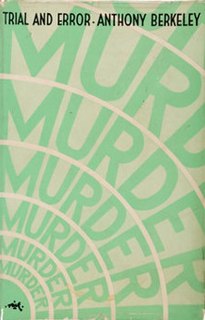
Trial and Error is a 1937 mystery detective novel by the British writer Anthony Berkeley. It was a loose sequel to the 1929 novel The Piccadilly Murder, featuring two of the characters from the earlier work the unprepossessing but shrewd Ambrose Chitterwick and Chief Inspector Moresby of Scotland Yard. Berkeley was a prominent author of the Golden Age of Detective Fiction, known for his inverted detective stories.
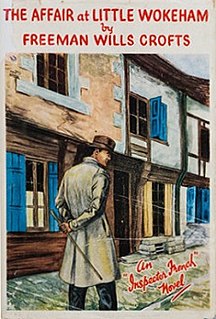
The Affair at Little Wokeham is a 1943 detective novel by the Irish writer Freeman Wills Crofts. It is the twenty fourth in his series of novels featuring Inspector French, a prominent figure of the Golden Age of Detective Fiction. It was published in the United States under the alternative title of Double Tragedy.

Found Floating is a 1937 detective novel by the Irish writer Freeman Wills Crofts. It is the sixteenth in his series of novels featuring Inspector French, a Scotland Yard detective of the Golden Age known for his methodical technique.
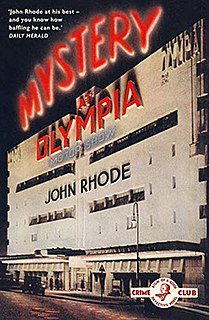
Mystery at Olympia is a 1935 detective novel by John Rhode, the pen name of the British writer Cecil Street. It is the twenty second in his long-running series of novels featuring Lancelot Priestley, an armchair detective who was able to solve mysteries without visiting the scene of the crime. It was published in the United States under the alternative title Murder at the Motor Show.
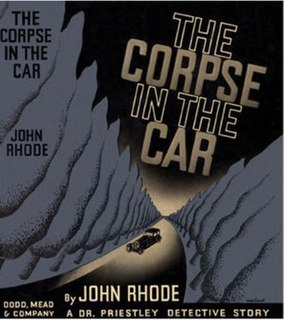
The Corpse in the Car is a 1935 detective novel by John Rhode, the pen name of the British writer Cecil Street. It is the twentieth in his long-running series of novels featuring Lancelot Priestley, a Golden Age armchair detective. A review by Ralph Partridge in the New Statesman commented "Mr. Rhode has written a humdrum, workaday book in The Corpse in the Car. He belongs to the English school of Freeman Wills Crofts, with which it is impossible to find technical fault." In The Spectator Rupert Hart-Davis considered that "The Corpse in the Car is greatly inferior to his last book, Shot at Dawn."

Death in Harley Street is a 1946 detective novel by John Rhode, the pen name of the British writer Cecil Street. It is the forty third in his long-running series of novels featuring Lancelot Priestley, a Golden Age armchair detective. Several sources consider it to be the author's masterpiece.
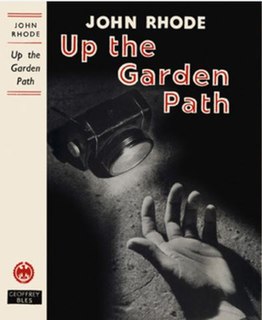
Up the Garden Path is a 1949 detective novel by John Rhode, the pen name of the British writer Cecil Street. It is the forty ninth in his long-running series of novels featuring Lancelot Priestley, a Golden Age armchair detective. It was published in America by Dodd Mead under the alternative title The Fatal Garden. Reviewing the novel in The Observer, Maurice Richardson concluded "Mr. Rhode has lost very little of his grip."
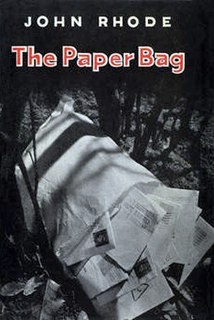
The Paper Bag is a 1948 detective novel by John Rhode, the pen name of the British writer Cecil Street. It is the forty sixth in his long-running series of novels featuring Lancelot Priestley, a Golden Age armchair detective. It was published in America by Dodd Mead under the alternative title The Links in the Chain.
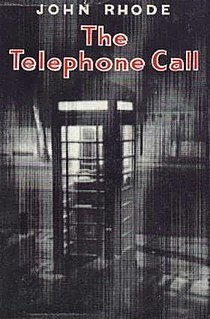
The Telephone Call is a 1948 detective novel by John Rhode, the pen name of the British writer Cecil Street. It is the forty seventh in his long-running series of novels featuring Lancelot Priestley, a Golden Age armchair detective. It was published in America by Dodd Mead under the alternative title Shadow of an Alibi. It is based on the real-life Wallace Case of 1931 in which William Herbert Wallace was convicted of murdering his wife Julia, a conviction which was later overturned on appeal.
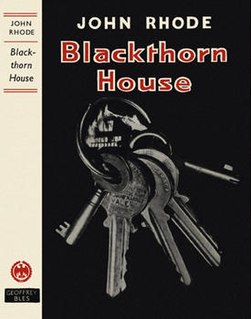
Blackthorn House is a 1949 detective novel by John Rhode, the pen name of the British writer Cecil Street. It is the forty eighth in his long-running series of novels featuring Lancelot Priestley, a Golden Age armchair detective.
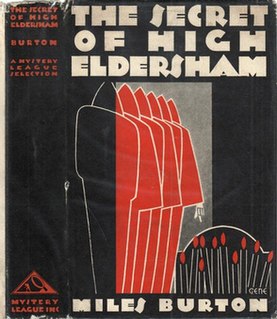
The Secret of High Eldersham is a 1930 detective novel by Miles Burton, the pen name of the British writer Cecil Street. It was the first novel in a lengthy series featuring the detective Desmond Merrion. Street was one of the most prolific authors of the Golden Age of Detective Fiction and had already enjoyed success with his Doctor Priestley series, written under the name of John Rhode. In 1931 it was published in the United States by the Mystery League under the altered title The Mystery of High Eldersham. Originally published in Britain by the Collins Crime Club, it was reissued in 2016 by British Library Publishing as part of a series of crime novels the Golden Age.

This Undesirable Residence is a 1942 detective novel by the British writer Cecil Street, writing under the pen name of Miles Burton. It was part of a lengthy series of books featuring the detective Desmond Merrion and Inspector Arnold of Scotland Yard. It was published in the United States by Dodd Mead under the alternative title Death at Ash House.
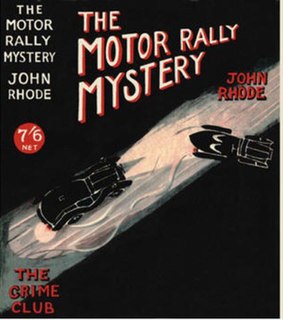
The Motor Rally Mystery is a 1933 detective novel by John Rhode, the pen name of the British writer Cecil Street. It is the fourteenth in his long-running series of novels featuring Lancelot Priestley, a Golden Age armchair detective. It was published in the United States by Dodd Mead under the alternative title Dr. Priestley Lays a Trap. It takes place against the backdrop of the real life RAC Motor Rally, which concluded at Torquay.

French Strikes Oil is a 1951 detective novel by the Irish-born writer Freeman Wills Crofts. It is the twenty eighth and penultimate entry in his series of novels featuring Inspector French, a Scotland Yard detective of the Golden Age known for his methodical technique. It was published in the United States by Dodd Mead under the alternative title of Dark Journey.

The Venner Crime is a 1933 detective novel by John Rhode, the pen name of the British writer Cecil Street. It is the sixteenth in his long-running series of novels featuring Lancelot Priestley, a Golden Age armchair detective. In Britain it was published by Odhams Press, the only one of his works be done so, while in the United States it was handled by his usual publisher Dodd Mead. It has been described as a sort of sequel to his previous book The Claverton Mystery. Writing in the New York Times Isaac Anderson considered "This is not one of the best of the Dr. Priestley yarns, but it is plenty good enough to pass an idle evening."

Dead Men at the Folly is a 1932 detective novel by John Rhode, the pen name of the British writer Cecil Street. It is the thirteenth in his long-running series of novels featuring Lancelot Priestley, a Golden Age armchair detective. It was published in the United States by Dodd Mead.




















